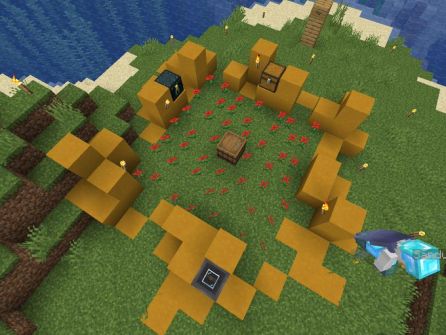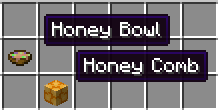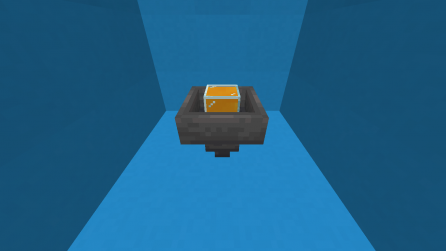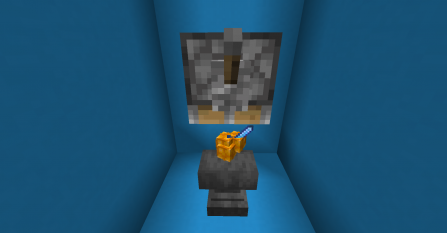Ambrosia
This module has been discontinued by Gamemode 4. It will not be receiving updates anymore, because it was made redundant by the addition of bees in Minecraft Version 1.15. |
 | |
| Module Type | Reliant |
|---|---|
| Created by | Sparks, Bloo and SpecialBuilder32 |
| Required Modules | Liquid Tanks |
| Compatible MC Versions | 1.14 |
This module adds bees, beehives, honey and more to Minecraft 1.14, and heavily alters early and mid-game mechanics by replacing natural regeneration. The mechanics and design of this module are different than the bees Mojang added in 1.15.
Getting Started
Ambrosia alters early and mid game drastically, requiring a change in playstyle and some extra infrastructure.
To help you getting started follow this general tutorial:
Getting a Beehive
- Starting a hive requires a Larvae, which can be found by breaking oak tree leaves manually.
- Once you have larvae, drop the larvae item onto a barrel to create a Beehive. Larvae have a lifespan of 8 Minecraft days, so make sure to use a fresh Larvae.
Producing Honey
- Plant flowers near the hive. Bees require flowers and air to survive and produce honey, and can use any flowers in a 7x3x7 area (7 wide, 3 high) centered on the hive. The more flowers you place, the faster the population of the hive will grow.
- There are two ways to collect honey from the hive; Honey Bowls and Honey Combs.
- Empty bowls (in stacks of 1) placed into the bee hive will eventually fill with honey to create a Honey Bowl.
- Leaving the hive empty will produce raw Honey Combs which, by using a Liquid Tank, can have their honey extracted and bottled into Honey Bottles.
- Consuming honey is the only way to get player regeneration early game, as regeneration from food is disabled with this module.
Features
Regeneration
This module heavily alters survival gameplay by disabling natural regeneration. As a result, players must have the Regeneration Potion effect to regain health, as Saturation from food does not heal the player. This module adds an early-game method to acquiring short bursts of regeneration, along with mid-game methods to gaining more powerful and longer lasting means of regeneration.
Larvae

Larvae drop from oak leaves when broken by players. When a leaf is broken, there's a chance that 1-2 larvae will drop; this chance can be increased by using a Fortune tool.
Larvae have a lifespan of one moon cycle (8 Minecraft days), which starts when they are retrieved from leaves. 8 days after a larvae is produced it will die. Attempting to use a dead larvae to create a beehive will not work, and change the name of the Larvae item to "Dead Larvae".
Larvae can also be used as white dye.
Beehives and Bees
Beehives can be created by throwing a larvae item on top of a barrel. The larvae must be living (less than 8 days old) to start a hive, otherwise the larvae item will be renamed to "Dead Larvae"
Bees require air and flowers to survive and reproduce. Bees from a beehive can visit any flowers in a 7x7x3 block region (7 wide, 3 tall) centered on the hive. More flowers nearby the hive results in a faster population growth, which in turn, results in faster honey production. A beehive without enough flowers nearby will slowly lose it's bee population until it becomes abandoned.
The ratio of air to flowers in the area around the beehive determines the rate of population growth, so it is important to have a roughly equal amount of air and flowers. Any small (single block) flowers or potted flowers will work.
Opening a Beehive will cause nearby bees to become angry, attacking players in the area. Bees deal a damage of 2 hearts without any protective armor or effects, and will die a little while after stinging a player.
Beehives can produce honey in two ways; Honey Bowls or Honey Combs.

- Empty bowls placed into a hive will slowly fill up with honey as bees build small honey-combs inside them. This produces "Honey Bowls", which can be consumed for 30 seconds of regeneration. This is the easiest way of getting regeneration early game, but gives the least regeneration due to the player also consuming the wax deposited in the bowl.
- If there are no empty bowls in the hive, bees will instead create "Honey Combs" directly inside the hive itself. Honey Combs can be processed to have their honey removed and bottled to give a longer lasting regeneration source.
Honey

Consuming honey will give the player the regeneration effect. There are several ways to consume honey.
The first is through Honey Bowls, extracted directly from beehives. Honey Bowls will give 30 seconds of regeneration when consumed, but are not stackable.
The other two ways are dependent on the Liquid Tanks module. Honey combs acquired from beehives can have 1 bucket of honey extracted from them with a liquid tank, leaving behind beeswax as a byproduct.
Empty bottles can filled with honey in a Honey Tank to produce Honey Bottles. Honey Bottles will give regeneration for 1 minutes and 20 seconds, and can be drank from 9 times before becoming empty. One bucket of honey is fills three bottles of honey, meaning one honey comb is equal to 3 bottles of honey.
Beetroots can be coated in honey in a Honey Tank to produce Honey Glazed Beetroots. One bucket of honey can glaze 3 beetroots. Honey Glazed Beetroots restore 1 health (1/2 heart) and 1 hunger (1/2 meat haunch), but are stackable, meaning the player can carry more of them at once than honey bottles. However, they cannot be eaten unless the player is hungry.
A Honey Tank can also directly apply the regeneration effect for 6 minutes and 40 seconds to players who stand beneath it.
Beeswax
Beeswax is obtained by extracting honey out of a honey comb with a Liquid Tank. Once the liquid tank drains the honey, beeswax is left behind.

Beeswax can be used to reduce the Repair Cost of tools. Repair Cost is the amount of levels required for a tool to be repaired in an anvil. To reduce the Repair Cost of an item, drop beeswax in an amount greater than or equal to the Repair Cost of the tool, along with the tool onto an anvil. Then power a downwards facing piston above the items to apply the wax onto the tool. This will lower the Repair Cost by one level, and can be repeated until the Repair Cost is 0.
It is possible to bring down the Repair Cost of a Tool by multiple levels per operation. A useful algorithm to reduce a tool's repair cost:
- Drop 64 beeswax and a tool of choice into the machine described above and power the piston.
- Check the amount of beeswax that was left behind:
- If the tool's Repair Cost was higher or equal to 64, the machine will consume the full stack of wax and set the Repair Cost to 63.
- If the tool's Repair Cost was lower than 64, the machine will consume 64-<Repair Cost> beeswax.
- Jump to instruction 1.
Instead of doing this step-wise, it's also possible to do multiple cycles with one piston push; for this drop multiple stack of wax onto the machine - each stack will run instruction 1 and 2.
Technical Details
Bee hives will only fill up bowls with honey if the bowls are in a stack of 1. Players can only drink bowls of honey when they are hungry, but can drink bottles of honey at any time.
Beeswax treats any tool with a Repair Cost of 65 or higher as having a Repair Cost of 64.
The speed of growth of a hive is roughly equal to:
v = (1/16)*Floor[flowers/(distance[(flowers/air);1]+1)]
Where v is the speed of growth. This results in an optimal growth rate when flowers/air is about equal to 1 whilst as many flowers as possible are planted nearby, as illustrated by this graph.
Advancements
| Advancement | Requirement |
|---|---|
Bugs, bugs, bugs everywhere! Make an invertebrate friend |
Find a larvae |
Plan B First a beehive, then the world |
Create a beehive |
A sweet upgrade Bottle some honey |
Get a bottle of honey |
Learn More and Download
History
| Version | Date | Change |
|---|---|---|
| 1.14 | 01 Sep 2019 | Released Public Beta on PSV |
| 03 Sep 2019 | Changed honey bottles to be drinkable up to 9 times before emptying | |
| Reduced honey bottles to 1 minute and 20 seconds of regeneration per drink | ||
| 05 Sep 2019 | Added honey-glazed beetroots | |
| 10 Sep 2019 | Released Ambrosia | |
| 30 Apr 2020 | Module marked as discontinued |

